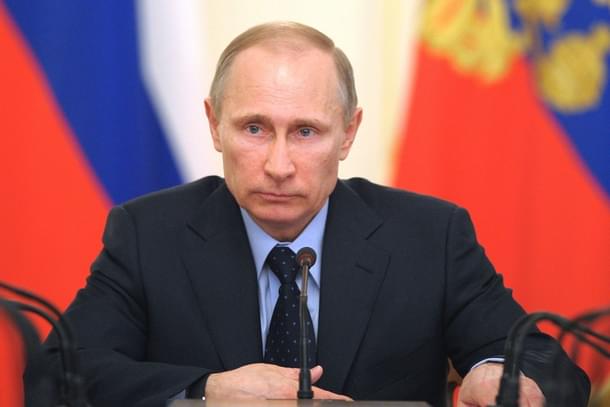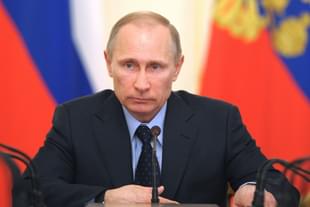News Brief
Putin Flashes Nuclear Card In The Ongoing Russia-Ukraine War; Here Is Everything You Need To Know
Swarajya Staff
Mar 01, 2022, 01:41 PM | Updated 01:40 PM IST
Save & read from anywhere!
Bookmark stories for easy access on any device or the Swarajya app.


On Sunday (27 February), Russian President Vladimir Putin put his nuclear forces on increased alert in a shocking escalation in the war on Ukraine and tension with the West since the collapse of the USSR. Russia's assault on Ukraine entered its fourth day with fighting in the streets of the country’s second-largest city Kharkiv.
Russian forces are focused on cutting off Ukraine’s southern coast and isolating it from the sea, while also penetrating Kharkiv in a bid to capture the capital Kyiv. In the face of an aggressive larger neighbour, Ukraine holds on while its President Volodymyr Zelenskyy has refused to leave the capital despite being the prime target most likely.
The Ukrainian civilians are also fighting alongside the military. With common people volunteering en masse, Ukraine has been able to offer stiff resistance. The country has already ordered men between 18-60 years old not to leave the country, and is also reportedly releasing prisoners with military experience who want to take up arms for their country.
Moving farther on brinkmanship, Putin ordered Russian nuclear weapons to be prepared for increased readiness to launch. The Russian president told his defence minister and the chief of the military’s General Staff to put the nuclear deterrent forces in a “special regime of combat duty”, reports Indian Express. He said that leading NATO powers had made “aggressive statements” toward Russia in addition to stiff economic sanctions and cutting leading Russian banks from the SWIFT banking system.
“I order the defense minister and the chief of the general staff of the Russian armed forces to put the deterrence forces of the Russian army into a special mode of combat service,” Putin said in a televised address. The “deterrence” used here includes nuclear forces.
However, the implications of Putin's statements are unclear. “It is still unclear what the increased alert involves,” Hans Kristensen, director of the nuclear information project at the Federation of American Scientists, reportedly said.
“There have been speculations that it might involve increasing the readiness of the nuclear command and control system to be more ready to transmit a launch order. There have also been some reports of increased activity of the missile submarines, but it is unclear if that is beyond the normal.”
Experts vary in their views as to why the Russian President chose to escalate despite any clear necessity. While Kremlin referred to aggressive statements regarding NATO-Russia clashes made by Western leaders, no Western leader has yet talked about a possibility of a direct war with Russia. Some scholars say this is typical brinkmanship by Russia to extract concessions from the West. Others say the statement is a reflection of the frustration at not being able to wrest quick military success in a "blitzkrieg" fashion as Ukrainians offer strong defence and are also going to receive arms and ammunition from other countries soon.
It is noteworthy that none of the four conditions for a nuclear strike mentioned in Russia’s nuclear doctrine, which Putin himself approved in 2020, have been met yet. The doctrine lists the following conditions which justify a nuclear response:
-if ballistic missiles are fired at Russia or an ally’s territory;
-if an enemy uses nuclear weapons;
-if there is an attack on a Russian nuclear weapons site;
-if there is an attack threatening the very existence of the Russian state.
Talks Take-Off
The Ukrainian president Zelenskyy agreed to send a Ukrainian delegation to meet with Russian counterparts at an unspecified time and location on the Belarusian border. Previously, Zelenskyy had rejected Putin’s offer to meet in the Belarusian city of Homel saying that Belarus was the launchpad of the Russian assault. Zelenskyy had named Warsaw, Bratislava, Istanbul, Budapest or Baku as alternative venues for talks, but eventually accepted the Belarus offer.
Reportedly, announcement about nuclear weapons came after Russia announced that its delegation had flown to Belarus to await talks. Russia also informed later that the Israeli Prime Minister Naftali Bennett, in a call with Putin, had offered to mediate. However, it is not clear whether Russia accepted the offer or not.
Ukrainian and Russian delegations met yesterday (28 February). The meeting ended with no immediate reports of agreements, but Mykhailo Podolyak, a top adviser to Ukrainian President Volodymyr Zelenskyy, said further talks could take place "in the near future."
Britain’s defence ministry said that the Russian forces were attempting to encircle Kyiv. The mayor Vitali Klitschko on Sunday told The Associated Press that he estimated some of the Russian attackers are within 20 kilometres (12 miles) of the city centre and that he feared for a long siege.
“Right now, we have electricity, right now we have water, and heating in our houses, but the infrastructure is destroyed … I guess we have not so much time,” Klitschko said.
As per UN refugee agency, approximately, 368,000 Ukrainians, mostly women and children, have fled the country and landed in neighbouring countries. The line of vehicles at the Poland-Ukraine border stretched 14 kilometres, and people had to wait for long hours in freezing temperatures. However, many brave men and women were also spotted heading home to defend Ukraine.
Meanwhile, Germany has announced not only military aid to Ukraine, but also an increase in its own defence spending. Scholz’s pledge of 100 billion euros for the armed forces would raise Germany’s defence spending above 2 per cent of GDP, satisfying a longstanding request by NATO allies.
Germany has announced that it would send 1,000 anti-tank weapons and 500 “Stinger” surface-to-air missiles to Ukraine. Those weapons are in addition to the 400 German-made anti-tank weapons as well as 9 D-30 howitzers and ammunition.
Till now, many European countries have closed their airspace to the Russian aircraft, including Britain, Germany, Czech Republic, Poland, Slovenia, Estonia, Latvia, Lithuania, Romania, Luxembourg, and the latest entrants being Italy and Austria.





